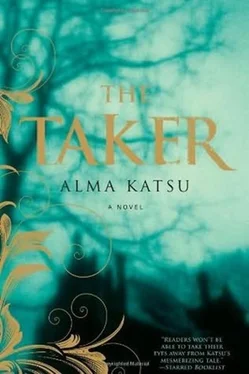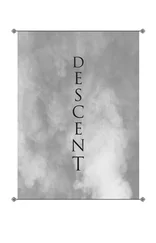“As soon as they moved out, I went in by myself. It was hard to imagine as the house I had known, so much had been changed. The part of the cellar under the front stairs had been updated. Cement floor, furnace, and hot water heaters. But the back half had been left alone. No electricity ran back there. It was left dark and damp.
“I went to the spot where-we’d put Adair. You couldn’t tell where the original wall left off and where the part Jonathan built began. It had all aged together by then. Still, no feeling from behind the stone. No presence. I didn’t know what to think. I was almost tempted-almost-to have the wall torn down. It’s like that perverse voice in your head that tells you to jump off the balcony when you get too close to the edge.” She smiles ruefully. “I didn’t, of course. As a matter of fact, I had the wall reinforced with rebar and cement. Had to be careful; I didn’t want the wall to be damaged during the construction. It’s sealed good and tight now. I sleep much better.” But she doesn’t sleep well; Luke has learned this much in the short time they’ve been together.
He needs to lead her away from the place he has left her, the dark cellar with the man she condemned. Luke reaches across the table and takes her hand. “Your story… it’s not finished yet, is it? So you and Jonathan left Adair’s house together-what happened next?”
Lanny seems to ignore the question for a moment, studying the nub of the cigarette in her hand. “We remained together for a few more years. At first, we stayed together because it was, ostensibly, the best thing to do. We could look out for each other, watch each other’s back, as it were. Those were adventurous times. We traveled constantly because we had to, because we didn’t know how to survive. We learned to create new identities for ourselves, how to become anonymous-though it was hard for Jonathan not to attract attention. People were always drawn to his great beauty. But then it became more and more apparent that we remained together because it was what I wanted. An ersatz marriage, only without intimacy. We were like an old couple in a loveless pact, and I’d forced Jonathan into the role of the philandering husband.”
“He didn’t have to stray,” Luke objects.
“It was in his nature. And the women who were interested in him-it was relentless.” She knocks ash into the saucer they are using for an ashtray. “We were both miserable. It got to the point where it was painful to be in each other’s presence; we had wronged each other so, and said hurtful things to each other. Sometimes I hated him and wished he would just go. I knew he would have to be the one to leave because I would never have the strength to leave him.
“Then one day, I woke up to find a note on the pillow beside me.” She smiles ironically, as though used to watching her pain from a distance. “He wrote, ‘Forgive me. This is for the best. Promise me you won’t come looking for me. If I change my mind, I will find you. Please honor my wish. Your dearest, J.’”
She pauses, crushing the cigarette in the saucer. Her expression is stark and faintly amused as she stares out the tall windows. “He finally found the courage to go. It was as if he’d read my mind. Of course, his leaving was agony. I wanted to die, sure that I would never see him again. But we go on, don’t we? Anyway, I had no choice, but it helps to pretend that you do.”
Luke remembers how it feels to be exhausted by tension, recalls those days when he and Tricia couldn’t stand to be in the same room. When he’d sit in the dark and try to imagine how it would feel if they split up, the peace that would come over him. There was no question that she’d be the one to leave-he couldn’t be expected to walk away from his children or his childhood home-but when his family had left and it was just him in the farmhouse, it wasn’t like being alone at all. It was as though something had been violently taken away from him, as though a piece of him had been amputated.
He gives her a moment to fold up her pain and tuck it back in its place. “But it wasn’t over, was it? Obviously, you saw each other again.”
Her expression is inscrutable, light and dark. “Yes, we did.”

PARIS, ONE MONTH AGO
Gray day. I peeked from behind the curtains at the thin sliver of sky visible from the third story of my home, one in a series of ancient row houses in the fifth arrondissement. It was the start of winter in Paris, which meant that almost every day would be gray.
I turned on my computer, then stood by the desk and stirred cream into my coffee while the computer started up. I find the series of whirs and clicks subliminally comforting, like the chirping of birds or some other sign of life external to mine. I cherish normalcy and long for as much routine as I can cram into what is otherwise a free-form existence.
I sipped the coffee. Though I don’t really need it the way some people do to pull them into consciousness, I drink it out of habit. I’d barely been asleep, a catnap really; I’d been up until the wee hours as usual, dutifully doing research needed for the book I had been contracted to write but which now bored me to impatience. Then, tiring of that, I resumed cataloging my ceramics collection while watching reruns of American television. I had gotten to the point of thinking I’d send my ceramics collection off to a university or an art museum, someplace where it would be seen. I’d gotten tired of having so much clutter around all the time, pulling at me like hands clawing from the grave. I felt the need to shed a few things.
My email finished loading and I glanced down the list of the senders’ addresses. Business, mostly: my lawyer, my editor at the wonky small press that had published my precious monographs on ancient Asian ceramics, an invitation to a party. What a life I’d made for myself over the past twenty years as a faux expert on Chinese teacups. My false identity was based on a collection of priceless cups my Chinese employer had pressed into my arms as I boarded a British ship to escape the ransacking nationalists. This had happened in The Jade Pagoda days, another lifetime ago, another story no one knew.
Then I noticed, in the list of emails, an address I didn’t recognize. From Zaire-oh, only it’s called the Democratic Republic of Congo now. I could remember when it was the Belgian Congo. I frowned to myself; did I know anyone in Zaire? It was probably a plea for charity or a scam, a con artist claiming to be an African prince who just needed a bit of help out of a temporary pecuniary dilemma. I almost deleted it without opening it but at the last minute changed my mind.
“Dear Lanny”-it read-“Hello from the one person you thought you’d never hear from again. First, let me thank you for honoring my last request by not trying to track me down at any point since we parted…”
Damn innocent words, written in flickering pixels on the screen. Print , I jabbed at the clicker on the mouse. Print, damn you, I need to hold these words in my hands.
“… I hope you’ll forgive me for imposing on you like this. For all its convenience, I’ve never gotten over the feeling that correspondence by email is somehow less polite and correct than writing a letter. I find using the telephone difficult for the same reason. But I’m pressed for time, so I had to resort to email. I will be in Paris in a few days and would like very much to see you while I am there. I hope your schedule will allow for this. Please write back and let me know if you will see me… Fondly, Jonathan.”
Читать дальше













